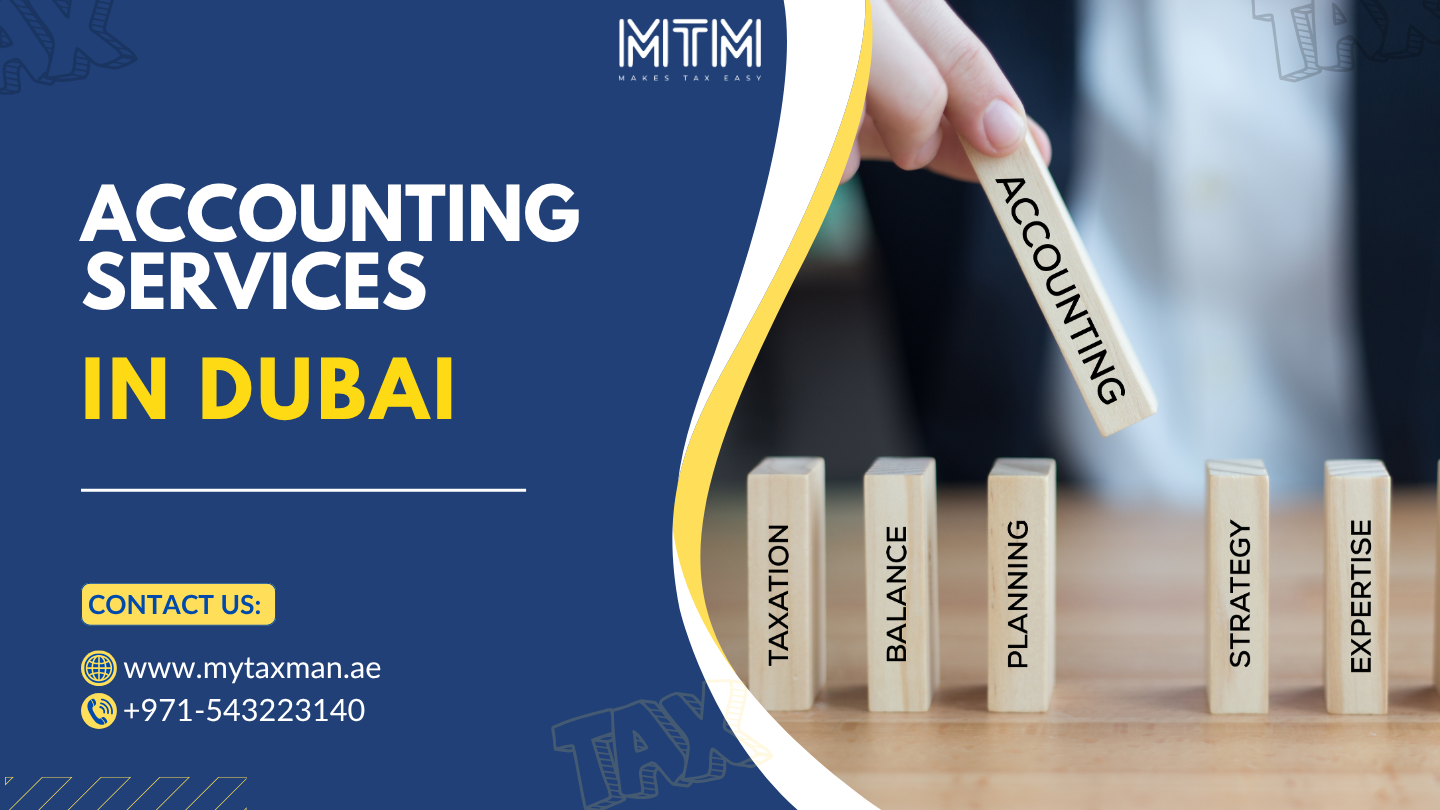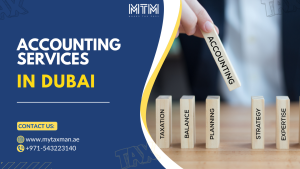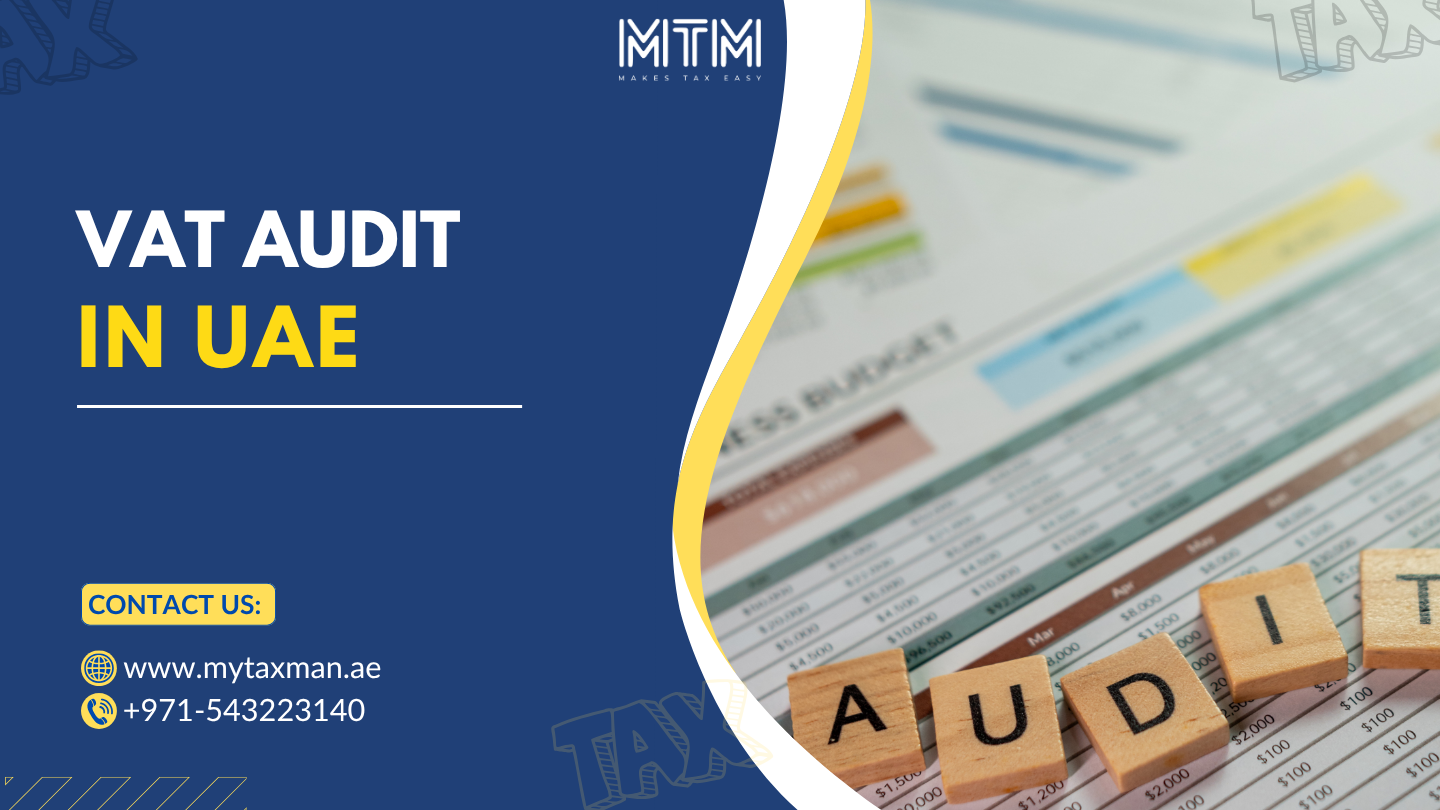Selecting the right accounting services can determine whether a business thrives or struggles in the competitive UAE market. With the introduction of corporate tax regulations, VAT compliance requirements, and evolving financial reporting standards, businesses across Dubai and the broader Emirates need more than basic bookkeeping—they need strategic financial partners who understand local regulations and global best practices. My Taxman offers comprehensive accounting services that combine technical expertise with industry-specific knowledge, helping businesses maintain compliance while optimizing their financial performance.
Table of Contents
ToggleWhy Professional Accounting Services Matter in the UAE
The UAE business environment has undergone significant transformation since the introduction of Federal Corporate Tax through Decree-Law No. 47 of 2022. Accounting services in UAE now require professionals who can interpret complex tax laws, maintain audit-ready records, support accurate tax filing, and advise on structuring and optimization strategies. Modern accounting extends far beyond data entry—it encompasses strategic advisory that helps businesses navigate regulatory requirements while identifying cost-saving opportunities and growth pathways.
Businesses operating in Dubai face unique challenges including mandatory VAT registration, corporate tax obligations, and jurisdiction-specific compliance requirements that vary between mainland, free zone, and offshore structures. Professional accounting and bookkeeping services in Dubai provide the technical foundation needed to meet these obligations while freeing business owners to focus on core operations. The right accounting partner transforms financial management from a compliance burden into a competitive advantage.

Key Services Offered by Leading Accounting Firms
Corporate Tax Compliance and Planning
The UAE corporate tax framework applies a 0% rate on taxable income up to AED 375,000 and a 9% rate on income above this threshold. Accounting services in Dubai help businesses calculate taxable income accurately, prepare tax returns through the EmaraTax portal, and ensure all documentation meets Federal Tax Authority standards. Expert tax advisors also identify legitimate deductions, optimize corporate structures, and develop strategies that minimize tax liability while maintaining full compliance.
Tax return submission must occur within nine months after the end of the relevant financial year, with payment due on the same date. Failure to file or pay on time results in penalties starting from AED 500 per month for late filing, increasing to AED 1,000 monthly after the first year, while failure to register attracts a AED 10,000 fine. Professional accounting services ensure businesses never face these costly penalties.
VAT Registration, Filing, and Advisory
VAT compliance represents another critical area where accounting services in UAE deliver value. Comprehensive VAT support includes registration with the Federal Tax Authority, preparation and submission of periodic returns, reconciliation of input and output tax, and strategic advice on VAT recovery opportunities. Expert VAT advisors help businesses understand exemptions, zero-rated supplies, and complex scenarios involving cross-border transactions.
Regular VAT filing prevents accumulation of penalties and ensures businesses maintain good standing with tax authorities. Professional firms use specialized software to track VAT obligations, automate calculations, and generate accurate returns that withstand FTA scrutiny.
Comprehensive Bookkeeping and Financial Reporting
Accurate bookkeeping forms the foundation of sound financial management. Accounting and bookkeeping services in Dubai maintain clean general ledgers, reconcile bank statements, track accounts receivable and payable, and prepare monthly, quarterly, and annual financial statements. These services ensure businesses always have current financial data for decision-making purposes.
Modern bookkeeping leverages cloud-based platforms like QuickBooks, Xero, and Zoho Books that provide real-time financial visibility, automated bank reconciliations, integration with point-of-sale systems, and multi-user collaboration capabilities. Cloud accounting allows business owners and managers to access financial information anywhere, anytime, enabling informed decisions without geographic constraints.
Audit Support and Assurance Services
Statutory audits serve multiple purposes including regulatory compliance, investor confidence, and internal control validation. Accounting services prepare businesses for external audits by organizing financial records, ensuring documentation completeness, and conducting pre-audit reviews that identify potential issues. This preparation significantly streamlines the audit process and reduces the risk of qualified opinions.
Transfer pricing documentation has become increasingly important under UAE corporate tax rules, particularly for businesses with related-party transactions. Articles 34-36 and Ministerial Decision No. 97 of 2023 require all related-party transactions to adhere to the arm’s length principle, with documentation thresholds triggered by transaction volumes and revenue ranges.
Payroll Management and HR Compliance
Payroll processing involves more than salary calculations—it requires compliance with Wage Protection System (WPS) requirements, end-of-service benefit calculations, labor law adherence, and proper maintenance of employee records. Professional accounting services in Dubai handle all payroll complexities, ensuring employees receive accurate and timely payments while businesses maintain compliance with Ministry of Human Resources and Emiratisation regulations.
How to Choose the Right Accounting Services in UAE
Assess Your Business-Specific Needs
Before selecting an accounting provider, businesses must evaluate their operational complexity, industry requirements, and growth objectives. A small e-commerce startup with straightforward transactions requires different support than a manufacturing company managing inventory, cross-border supply chains, and complex cost accounting. Defining specific pain points—whether cash flow visibility, tax planning, or financial forecasting—helps identify providers with relevant expertise.
Industry specialization matters significantly because accounting treatments, regulatory requirements, and operational metrics vary across sectors. Firms with experience in specific industries understand nuances that generic providers might overlook, such as project accounting for construction, inventory valuation for retail, or revenue recognition for service businesses.
Verify Credentials and Local Expertise
Professional certifications including CPA, ACCA, CMA, and local licensing demonstrate technical competence and ethical standards. Accounting services in UAE should employ qualified professionals who maintain continuing education and stay current with regulatory changes. Membership in professional bodies like the Institute of Chartered Accountants or local accounting associations provides additional quality assurance.
Local expertise proves invaluable when navigating UAE-specific requirements. Understanding differences between mainland, free zone, and offshore jurisdictions—including ownership rules, tax treatments, and reporting obligations—requires practical experience that only comes from working extensively in the UAE market. Firms with established relationships with government entities often process applications and resolve issues more efficiently.
Evaluate Technology and Automation Capabilities
The future of accounting services belongs to firms embracing digital transformation. Cloud-based accounting solutions provide real-time financial reporting, automated bank reconciliations and invoicing, integration with business systems, and secure remote access. Artificial intelligence and machine learning automate repetitive tasks like data entry, invoice processing, and expense categorization, reducing errors and freeing accountants for higher-value advisory work.
When evaluating accounting and bookkeeping services in Dubai, businesses should inquire about software platforms used, data security protocols, automation capabilities, and reporting functionality. Modern systems should offer customizable dashboards, mobile access, and integration with existing business applications.
Consider Scalability and Service Breadth
Business needs evolve as companies grow, enter new markets, or add product lines. Selecting an accounting partner capable of scaling services prevents disruptive provider changes down the road. Comprehensive firms offer everything from basic bookkeeping to sophisticated financial modeling, mergers and acquisitions support, and international expansion advisory.
Service integration creates efficiency and consistency when one provider handles accounting, tax compliance, payroll, audit coordination, and strategic planning. This integrated approach ensures all financial functions align and information flows seamlessly between different areas.
Review Client Testimonials and Case Studies
Client feedback reveals how accounting firms perform in practice rather than theory. Reviews and testimonials provide insights into communication quality, responsiveness, problem-solving ability, and long-term relationship management. Requesting references from businesses similar in size and industry offers the most relevant perspective.
Case studies demonstrate how firms have addressed specific challenges, whether implementing new accounting systems, resolving tax disputes, or supporting rapid growth. Firms confident in their capabilities willingly share success stories that illustrate their approach and results.
Common Mistakes When Selecting Accounting Services
Prioritizing Cost Over Value
Selecting the cheapest accounting services often proves expensive in the long run. Low-cost providers may lack necessary expertise, use outdated methods, provide inconsistent service, or miss critical deadlines that result in penalties. Quality accounting services represent an investment that pays returns through compliance assurance, strategic insights, and operational efficiency.
Transparent pricing structures outline exactly what services are included, how additional work is charged, and what deliverables clients receive. Unclear pricing often leads to unexpected costs and billing disputes.
Overlooking Industry Experience
Generic accounting firms may understand general principles but lack sector-specific knowledge that creates real value. Industries like real estate, construction, healthcare, hospitality, and manufacturing each have unique accounting requirements, performance metrics, and regulatory considerations. Providers with relevant industry experience deliver insights beyond basic compliance, such as benchmarking against industry standards, identifying sector-specific tax benefits, and understanding operational metrics that drive success.
Ignoring Technology Adoption
Firms still relying primarily on manual processes and spreadsheets cannot deliver the speed, accuracy, and insights that modern businesses require. Digital transformation in accounting—including cloud computing, artificial intelligence, and blockchain—represents the industry’s direction, not a distant future. Businesses partnering with technologically outdated providers will eventually need to switch, causing disruption and additional costs.
Failing to Verify Compliance Track Record
Accounting errors or compliance failures can result in substantial financial penalties, damaged business reputation, and even legal consequences. Businesses should inquire about a provider’s compliance track record, professional indemnity insurance, quality control procedures, and how they stay current with regulatory changes. Firms should demonstrate systematic processes for monitoring deadlines, reviewing work, and ensuring accuracy before submissions.
Current Trends Shaping Accounting Services in UAE
Corporate Tax Implementation and Advisory
Corporate tax implementation has fundamentally changed the accounting landscape, transforming accountants from bookkeepers into strategic tax advisors. Businesses now need guidance on tax-efficient structuring, transfer pricing compliance, group relief provisions, and optimization strategies that minimize liability while maintaining compliance. The September 30, 2025 deadline for FY 2024 corporate tax filings has created urgent demand for firms capable of completing audited accounts, making transfer pricing adjustments, and preparing comprehensive documentation.
Cloud-Based Solutions and Real-Time Reporting
Cloud accounting has evolved from competitive advantage to essential requirement. Platforms providing real-time financial visibility enable faster, better-informed decision-making compared to traditional month-end reporting. Cost-effectiveness stems from eliminating infrastructure investments while receiving automatic updates and enterprise-grade security. Scalability allows systems to grow seamlessly with business expansion.
Automation and Artificial Intelligence
Automation is revolutionizing accounting services by handling repetitive tasks with greater speed and accuracy than manual processing. AI-powered systems extract data from invoices, categorize transactions, flag anomalies requiring attention, and generate standard reports automatically. This technology allows accounting professionals to focus on analysis, advisory, and strategic planning rather than data entry. Businesses benefit from reduced processing costs, faster turnaround times, and fewer errors.
Advisory and Strategic Decision Support
The role of accounting services has expanded from historical reporting to forward-looking guidance. Modern accounting firms provide cash flow forecasting, scenario modeling, profitability analysis by product or service line, pricing strategy support, and strategic planning assistance. This advisory function helps businesses make informed decisions about expansion, investment, cost management, and resource allocation.
Why My Taxman Stands Out for Accounting Services
My Taxman delivers comprehensive accounting services in UAE that combine deep regulatory knowledge with industry-specific expertise. The firm’s service portfolio encompasses corporate tax compliance, VAT registration and filing, accounting and bookkeeping, transfer pricing documentation, valuation assessment, due diligence support, and fundraising advisory. This integrated approach ensures all aspects of financial management work together seamlessly.
The team at My Taxman understands the unique challenges facing businesses across different sectors and jurisdictions in the UAE. Whether operating in Dubai mainland, a free zone, or offshore, clients receive tailored guidance that addresses their specific regulatory environment and business objectives. The firm’s commitment to leveraging modern technology—including cloud-based platforms and automation tools—ensures clients receive accurate, timely information for decision-making.
Client service excellence defines the My Taxman approach. The firm maintains transparent communication, provides clear explanations of complex regulations, meets all deadlines consistently, and delivers strategic insights that extend beyond basic compliance. Businesses partnering with My Taxman gain confidence that their financial foundations are sound, their compliance obligations are met, and their growth strategies are supported by expert analysis.
Taking the Next Step with Professional Accounting Services
Choosing the right accounting services represents one of the most important decisions for business success in the UAE. Professional accounting support ensures compliance with corporate tax and VAT requirements, provides accurate financial information for strategic decisions, identifies cost-saving opportunities and efficiency improvements, and supports sustainable growth through expert advisory. The investment in quality accounting services pays returns through avoided penalties, optimized tax positions, operational efficiency, and strategic insights.
Businesses seeking accounting services in Dubai should begin with a thorough needs assessment, evaluate potential providers based on credentials and experience, discuss technology platforms and service approaches, and review pricing structures and deliverables. The right partner will demonstrate genuine interest in understanding business objectives, provide clear explanations without unnecessary jargon, offer realistic timelines and transparent pricing, and present a comprehensive service offering that scales with growth.
My Taxman offers the expertise, technology, and client-focused approach that businesses need to thrive in the UAE’s dynamic market. From startups establishing their financial foundations to established enterprises managing complex compliance requirements, My Taxman delivers accounting and bookkeeping services in Dubai that create lasting value.
Ready to optimize your financial management and ensure complete compliance? Contact My Taxman today for a consultation: +971-543223140.
Frequently Asked Questions
Q1: What accounting services do UAE businesses need most?
UAE businesses typically require bookkeeping, VAT registration and filing, corporate tax compliance, payroll processing, financial statement preparation, and audit support. Specific needs vary based on business size, industry, and complexity.
Q2: How much do accounting services in Dubai cost?
Accounting service costs in Dubai vary widely based on business complexity and service scope. Basic packages start around AED 999 per month for small businesses with limited transactions, while comprehensive services for larger enterprises cost considerably more. Quality providers offer transparent pricing based on specific requirements.
Q3: What is the last date for filing UAE corporate tax?
Businesses must file corporate tax returns within nine months after the end of their relevant financial year. For companies with financial years ending December 31, 2024, the deadline is September 30, 2025. Payment is due on the same date as return submission.
Q4: Do small businesses in Dubai need professional accounting services?
Yes, small businesses benefit significantly from professional accounting services. These services ensure compliance with tax and regulatory requirements, provide accurate financial information for decision-making, save time that owners can invest in business development, and help avoid costly errors or penalties. Many firms offer scaled packages suitable for small business budgets.
Q5: What is the difference between bookkeeping and accounting services?
Bookkeeping involves recording daily transactions, maintaining general ledgers, reconciling bank statements, and tracking receivables and payables. Accounting encompasses bookkeeping plus financial statement preparation, tax planning and compliance, financial analysis and reporting, and strategic advisory. Most businesses need both functions, often provided together by accounting firms.
Q6: How can accounting services help with UAE corporate tax compliance?
Professional accounting services help businesses understand corporate tax obligations, maintain audit-ready financial records, calculate taxable income accurately, prepare and file tax returns through EmaraTax, develop tax optimization strategies, and ensure transfer pricing documentation compliance. Expert support minimizes penalty risk and identifies legitimate tax-saving opportunities.











